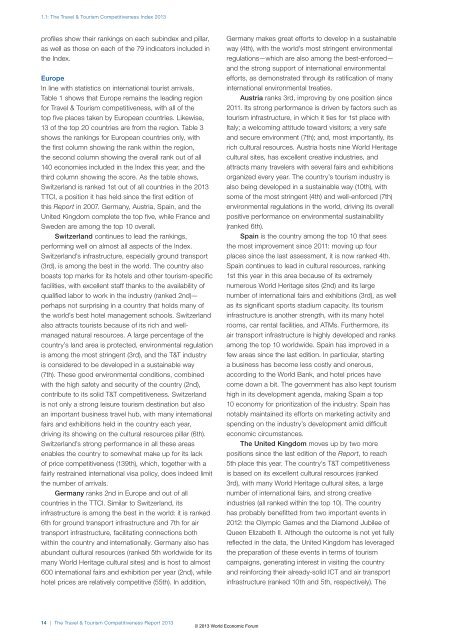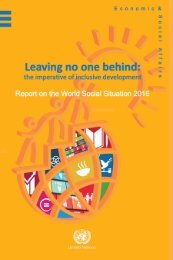The Travel & Tourism Competitiveness Report 2013
The Travel & Tourism Competitiveness Report 2013
The Travel & Tourism Competitiveness Report 2013
You also want an ePaper? Increase the reach of your titles
YUMPU automatically turns print PDFs into web optimized ePapers that Google loves.
1.1: <strong>The</strong> <strong>Travel</strong> & <strong>Tourism</strong> <strong>Competitiveness</strong> Index <strong>2013</strong><br />
profiles show their rankings on each subindex and pillar,<br />
as well as those on each of the 79 indicators included in<br />
the Index.<br />
Europe<br />
In line with statistics on international tourist arrivals,<br />
Table 1 shows that Europe remains the leading region<br />
for <strong>Travel</strong> & <strong>Tourism</strong> competitiveness, with all of the<br />
top five places taken by European countries. Likewise,<br />
13 of the top 20 countries are from the region. Table 3<br />
shows the rankings for European countries only, with<br />
the first column showing the rank within the region,<br />
the second column showing the overall rank out of all<br />
140 economies included in the Index this year, and the<br />
third column showing the score. As the table shows,<br />
Switzerland is ranked 1st out of all countries in the <strong>2013</strong><br />
TTCI, a position it has held since the first edition of<br />
this <strong>Report</strong> in 2007. Germany, Austria, Spain, and the<br />
United Kingdom complete the top five, while France and<br />
Sweden are among the top 10 overall.<br />
Switzerland continues to lead the rankings,<br />
performing well on almost all aspects of the Index.<br />
Switzerland’s infrastructure, especially ground transport<br />
(3rd), is among the best in the world. <strong>The</strong> country also<br />
boasts top marks for its hotels and other tourism-specific<br />
facilities, with excellent staff thanks to the availability of<br />
qualified labor to work in the industry (ranked 2nd)—<br />
perhaps not surprising in a country that holds many of<br />
the world’s best hotel management schools. Switzerland<br />
also attracts tourists because of its rich and wellmanaged<br />
natural resources. A large percentage of the<br />
country’s land area is protected, environmental regulation<br />
is among the most stringent (3rd), and the T&T industry<br />
is considered to be developed in a sustainable way<br />
(7th). <strong>The</strong>se good environmental conditions, combined<br />
with the high safety and security of the country (2nd),<br />
contribute to its solid T&T competitiveness. Switzerland<br />
is not only a strong leisure tourism destination but also<br />
an important business travel hub, with many international<br />
fairs and exhibitions held in the country each year,<br />
driving its showing on the cultural resources pillar (6th).<br />
Switzerland’s strong performance in all these areas<br />
enables the country to somewhat make up for its lack<br />
of price competitiveness (139th), which, together with a<br />
fairly restrained international visa policy, does indeed limit<br />
the number of arrivals.<br />
Germany ranks 2nd in Europe and out of all<br />
countries in the TTCI. Similar to Switzerland, its<br />
infrastructure is among the best in the world: it is ranked<br />
6th for ground transport infrastructure and 7th for air<br />
transport infrastructure, facilitating connections both<br />
within the country and internationally. Germany also has<br />
abundant cultural resources (ranked 5th worldwide for its<br />
many World Heritage cultural sites) and is host to almost<br />
600 international fairs and exhibition per year (2nd), while<br />
hotel prices are relatively competitive (55th). In addition,<br />
14 | <strong>The</strong> <strong>Travel</strong> & <strong>Tourism</strong> <strong>Competitiveness</strong> <strong>Report</strong> <strong>2013</strong><br />
Germany makes great efforts to develop in a sustainable<br />
way (4th), with the world’s most stringent environmental<br />
regulations—which are also among the best-enforced—<br />
and the strong support of international environmental<br />
efforts, as demonstrated through its ratification of many<br />
international environmental treaties.<br />
Austria ranks 3rd, improving by one position since<br />
2011. Its strong performance is driven by factors such as<br />
tourism infrastructure, in which it ties for 1st place with<br />
Italy; a welcoming attitude toward visitors; a very safe<br />
and secure environment (7th); and, most importantly, its<br />
rich cultural resources. Austria hosts nine World Heritage<br />
cultural sites, has excellent creative industries, and<br />
attracts many travelers with several fairs and exhibitions<br />
organized every year. <strong>The</strong> country’s tourism industry is<br />
also being developed in a sustainable way (10th), with<br />
some of the most stringent (4th) and well-enforced (7th)<br />
environmental regulations in the world, driving its overall<br />
positive performance on environmental sustainability<br />
(ranked 6th).<br />
Spain is the country among the top 10 that sees<br />
the most improvement since 2011: moving up four<br />
places since the last assessment, it is now ranked 4th.<br />
Spain continues to lead in cultural resources, ranking<br />
1st this year in this area because of its extremely<br />
numerous World Heritage sites (2nd) and its large<br />
number of international fairs and exhibitions (3rd), as well<br />
as its significant sports stadium capacity. Its tourism<br />
infrastructure is another strength, with its many hotel<br />
rooms, car rental facilities, and ATMs. Furthermore, its<br />
air transport infrastructure is highly developed and ranks<br />
among the top 10 worldwide. Spain has improved in a<br />
few areas since the last edition. In particular, starting<br />
a business has become less costly and onerous,<br />
according to the World Bank, and hotel prices have<br />
come down a bit. <strong>The</strong> government has also kept tourism<br />
high in its development agenda, making Spain a top<br />
10 economy for prioritization of the industry. Spain has<br />
notably maintained its efforts on marketing activity and<br />
spending on the industry’s development amid difficult<br />
economic circumstances.<br />
<strong>The</strong> United Kingdom moves up by two more<br />
positions since the last edition of the <strong>Report</strong>, to reach<br />
5th place this year. <strong>The</strong> country’s T&T competitiveness<br />
is based on its excellent cultural resources (ranked<br />
3rd), with many World Heritage cultural sites, a large<br />
number of international fairs, and strong creative<br />
industries (all ranked within the top 10). <strong>The</strong> country<br />
has probably benefitted from two important events in<br />
2012: the Olympic Games and the Diamond Jubilee of<br />
Queen Elizabeth II. Although the outcome is not yet fully<br />
reflected in the data, the United Kingdom has leveraged<br />
the preparation of these events in terms of tourism<br />
campaigns, generating interest in visiting the country<br />
and reinforcing their already-solid ICT and air transport<br />
infrastructure (ranked 10th and 5th, respectively). <strong>The</strong><br />
© <strong>2013</strong> World Economic Forum

















